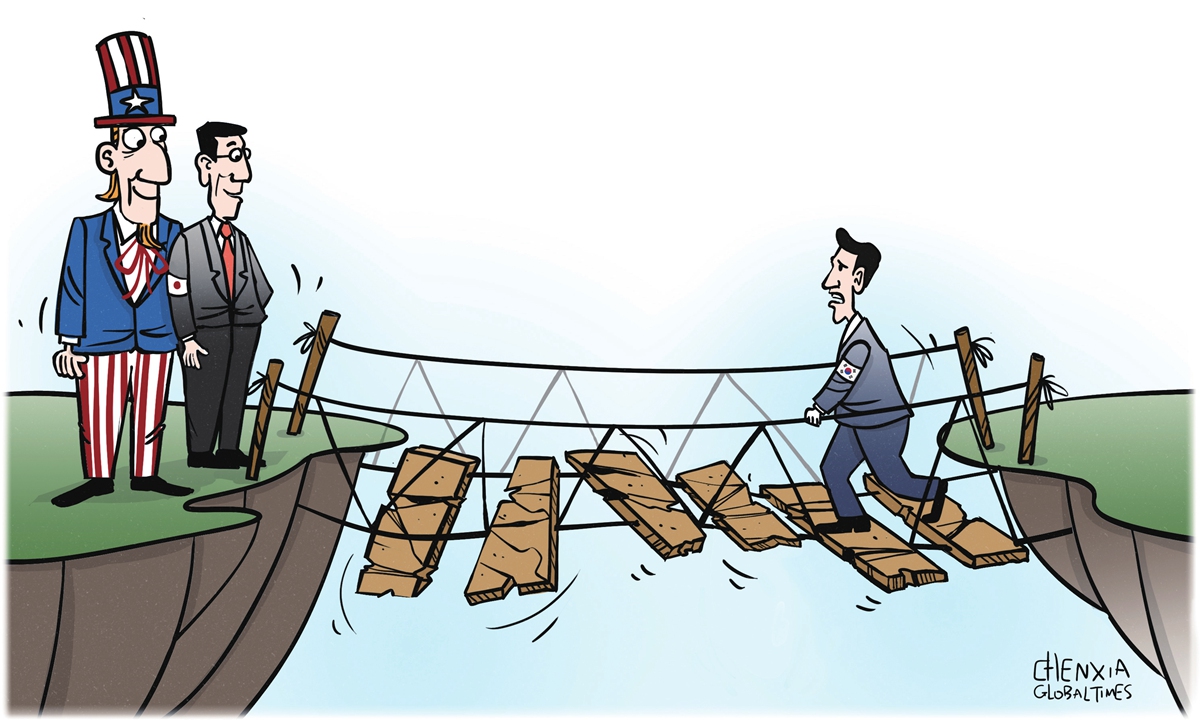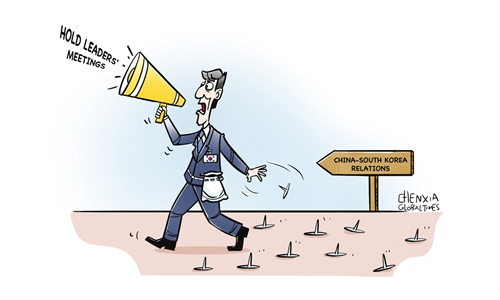
Illustration: Chen Xia/GT
Yun Duk-min, the South Korean ambassador to Japan, stated that "high-level" talks are underway for a China-South Korea-Japan summit poised to happen this year, and there may be a "Camp David effect" that prompted China to reach out to its neighbors, Bloomberg reported on Friday. Yun also emphasized that the trilateral meeting among South Korea, Japan and China will not harm the relationship between Seoul and Washington. Given that Yun is not only the South Korean ambassador to Japan but also one of the key foreign policy aides during the election campaign of South Korea President Yoon Suk-yeol, his words reflect a serious misunderstanding of South Korea's own position, and trilateral cooperation among China, Japan and South Korea.Firstly, South Korea overestimated the impact of the Camp David summit on enhancing Seoul's international status. Yoon has been proactively promoting the improvement of South Korea-Japan relations and participating in strengthening trilateral cooperation with the US and Japan, with the aim of enhancing South Korea's international status. However, in this process, the US once again demonstrated its ability to coerce and entice its allies, obtaining everything Washington wants while South Korea lost what it should not have lost. Apart from making "contributions" to the US-Japan-South Korea alliance, South Korea did not gain any substantial benefits. The Camp David summit did not enhance South Korea's status, but rather the US' status. In fact, for the Chinese people, South Korea did not increase its international status but rather diminished it by further ceding its sovereignty to the US and Japan.
Secondly, South Korea has misinterpreted the status of the trilateral summit among China, Japan and South Korea. Yun has portrayed the trilateral summit as a result of the strengthened cooperation among the US, Japan and South Korea, which is a distortion of the original intention of the China-South Korea-Japan high-level talks.
The trilateral summit among China, Japan and South Korea began in November 1999, and in December 2008, the leaders of the three countries met for the first time outside the 10+3 framework in Fukuoka, Japan, and decided to build a future-oriented comprehensive cooperative partnership. The three countries also decided to hold separate annual trilateral summit meetings on a rotating basis while keeping the mechanism of trilateral leaders' meeting in the sidelines of the 10+3 Summit.
Thirdly, South Korea intentionally conceals the negative effects of Camp David summit. The so-called "effect" of the Camp David meeting among the leaders of the US, Japan and South Korea did exist, but it did not stimulate China's desire to resume the trilateral meeting among China, Japan and South Korea. Instead, it stimulated neighboring countries to rethink how to respond to the "new cold war" initiated by the US, Japan and South Korea.
North Korea's leader Kim Jong-un recently visited Russia. The US, Japan and South Korea never reflect on who first created the division in Northeast Asia and who has been pushing for the formation of a "new cold war" pattern in Northeast Asia. Instead, they are shifting the blame and claiming that North Korea and Russia's cooperation will lead to a more aggressive response from the US, Japan and South Korea.
China's stance toward cooperation among China, Japan and South Korea has always been consistent. China attaches importance to such cooperation and believes that trilateral cooperation is in the common interest of the three countries. China also supports South Korea as the chair country for hosting this meeting. However, South Korea should not perceive China's support as a sign of weakness or as a result of Seoul leaning toward the Washington and Tokyo to gain a so-called greater say. It would be very dangerous if South Korea has such thoughts, and we hope that South Korea will wake up to this reality as soon as possible.
The author is the director and professor of the Center for Korean Peninsula Studies at the Shanghai University of International Business and Economics. opinion@globaltimes.com.cn

